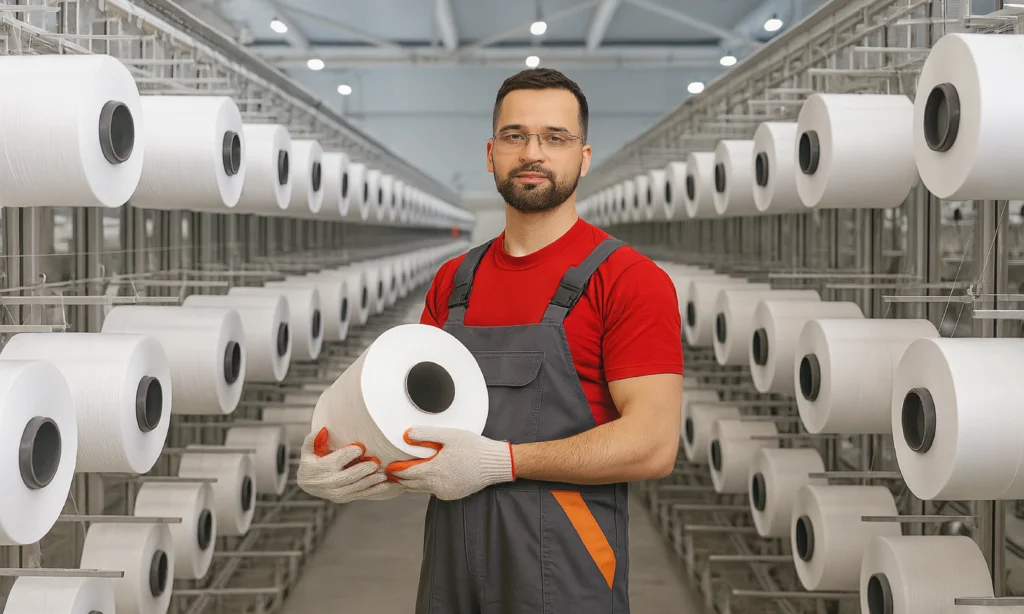The textile and garment industry in Italy has been a major pillar in the manufacturing industry of the country as it has combined the artisanal tradition of centuries with the technology of modern fashion. In 2025, the sector still offers a variety of labor job opportunities in the factories that are located in the regions that are famous in fashion and textile producing, such as Lombardy, Veneto, and Tuscany. To workers who want to enter or gain a promotion in the apparel manufacturing industry, it is critical to know the range of positions, the skills necessary, wages, and the changing employment sector.
Overview of Italy’s Textile and Garment Industry
Italy is world renowned in terms of its luxury fashions and top quality textiles, which are commonly labeled as Made in Italy. Factories that are involved in various stages of production such as dyeing of fabrics, cutting, sewing, pattern making, embroidery and finishing support this reputation.
Automation has increased, but still, there are numerous activities which are labor-intensive and require skilled and semi-skilled labor. The garment and textile industry provides hundreds of thousands of jobs in small craft shops and bigger factories and plays a prominent role in the economy of the region and the export earnings.
Common Labor Jobs in Textile and Garment Factories
The garment and textile factories in Italy need various forms of labor activities, which range between manual labor and semi-technical jobs. Some of the important labor positions are:
Sewing Machine Operator
They are in charge of sewing fabric into clothing. Professional operators work on different seams, buttonhole, zipper, and decorative stitching machines. Accuracy and speed is critical since operators are operating under strict deadlines in production.
Cutter
Cutters are workers who ready layers of textile to be manufactured by cutting fabric as per the pattern given by designers. Precision eliminates wastage of fabrics and quality control up-stream.
Textile Machine Operator
Operators operate machines which knit, weave, dye or print fabrics. This is a specialized job that needs technical skills to observe the operation of the machine, correct small errors, and ensure continuity in the production of fabrics.
Tailor
Tailors are specialized in the finishing of garments, alterations and quality assurance whereby the pieces of clothing are checked to ensure that they are of the required standards before they are shipped.
Pattern Maker
These employees interpret design drawings into patterns that are cut on cloth. The job requires spatial ability and familiarity with the standards of measurement as applied to the fitting of garments.
Quality Checker
Quality checkers go through the finished products at different stages of production to make sure that the defects are detected and corrected in the early stages of the production process to keep the fashion standards high which is the characteristic of Italian manufacturers.
Embroidery Machine Operator
These specialists work with automated embroidery machines which decorate or brand the clothing and textiles with stitches, and they should be aware of programming and the maintenance of machines to perfect the design.
Highly Needed Skills and Qualifications
Although most of the jobs in the factory labor sector in Italy do not need formal degrees, there are certain skills and training that enhance employment:
- Hand skills and coordination of eyes and hand to sew, cut or operate a machine.
- Elementary knowledge of textile equipment and manufacturing process.
- The capacity to read technical patterns and schematics (especially those of cutters and pattern makers).
- Quality control and finishing tasks attention to detail.
- It is good to have experience with industrial sewing machines or embroidery technology.
- Language: It is usually required to know basic Italian in order to communicate and adhere to safety requirements.
- The ability to work shifts including overtime in high production periods.
Italy has several training programs and apprenticeships that can be used to increase the skill level in the textile manufacturing industry, as the industry is faced with more demand of skilled labour.
Wage Expectations and Work Conditions
Market data indicate that the average pay of textile and garment factory labor jobs in Italy is between 1200 and 1800 euros a month depending on experience and location. The more specialized the operators or technicians are, the more they can be paid, with salaries of more than 2,000 euros per month in large production centers.
Factories are often working in shifts to achieve the production deadlines, particularly in the luxury industry where the seasonal collections presuppose the intensive working periods. Whereas in small workshops the working hours may be flexible, medium and large factories have standard working hours and overtime premium.
The Italian labor law provides worker protection in terms of benefits like social security, healthcare, paid vacations, and severance allowances. Other companies offer other benefits such as training incentives and performance incentives.
Present Employment Patterns and Employment Prospects
Italian textile and garment sector is in a paradox of high demand of skilled labor and chronic shortage of workforce. The Altagamma 2024 report estimates that the manufacturing sector dealing with fashion requires more than 75,000 new professionals by 2028, and that it is experiencing recruitment difficulties in about half of vacancies.
The manufacturers are now more interested in hiring young people who are ready to learn the craft as well as the technical skills that integrate manual production with the innovations in the factory that is digital. This tendency increases the need in apprenticeships and partnership with vocational schools.
Also, the increased interest in sustainable and ethically made fashion has established new positions in the area of quality assurance and compliance, which further expanded the range of labor in factories.
How to Find Textile and Garment Factory Labor Jobs in Italy
- Job Portals: Aurawoo, Indeed Italy, and LinkedIn websites provide up-to-date vacancies of sewing operators, cutters, and machine operators.
- Recruitment Agencies: These are special agencies that link candidates with factories that need seasonal or permanent workers.
- Vocational schools and apprenticeship: The contacts rely on the technical schools that open up access to entry training along with factory placements.
- Industry Events and Career Fairs: Expos in fashion and manufacturing industries can be used as a means of networking, where one will have a chance to meet their future employer; an Italian textile factory.
Conclusion
In 2025, textile and garment factory labor positions in Italy continue to be a lively part of the national economy and the fashion system in the world. These jobs include sewing machine operators and cutters, quality checkers and embroidery specialists, which provide a wide range of career opportunities to workers with different skills and experience levels.
Since Italian producers will modernize and focus on sustainability, the demand of labor will change, focusing on flexibility and technical skills. The proper skills and motivation of job seekers can help them to find good jobs in this prestigious industry and continue the textile excellence of Italy.



